Leadership & Management: Theories & Culture for High Performance
VerifiedAdded on 2023/06/18
|12
|1087
|280
Report
AI Summary
This report examines the crucial roles of leadership and management in fostering a high-performing work culture, particularly within the context of Tesco. It emphasizes how effective leadership and management motivate employees, provide guidance, and enhance their contributions towards achieving organizational goals. The report highlights the importance of organizational culture in improving employee efficiency and productivity. Key components such as management development programs, including coaching and mentoring, are discussed as strategic tools for strengthening business managers and enhancing employee skills. Furthermore, the application of various business theories, such as classical, behavioral, situational, and transactional management theories, is explored in relation to their impact on employee performance and organizational success. The report concludes that a strong organizational culture, coupled with effective leadership and management practices, is essential for driving employee engagement, improving productivity, and achieving sustainable competitive advantages.

Leadership
management
management
Paraphrase This Document
Need a fresh take? Get an instant paraphrase of this document with our AI Paraphraser
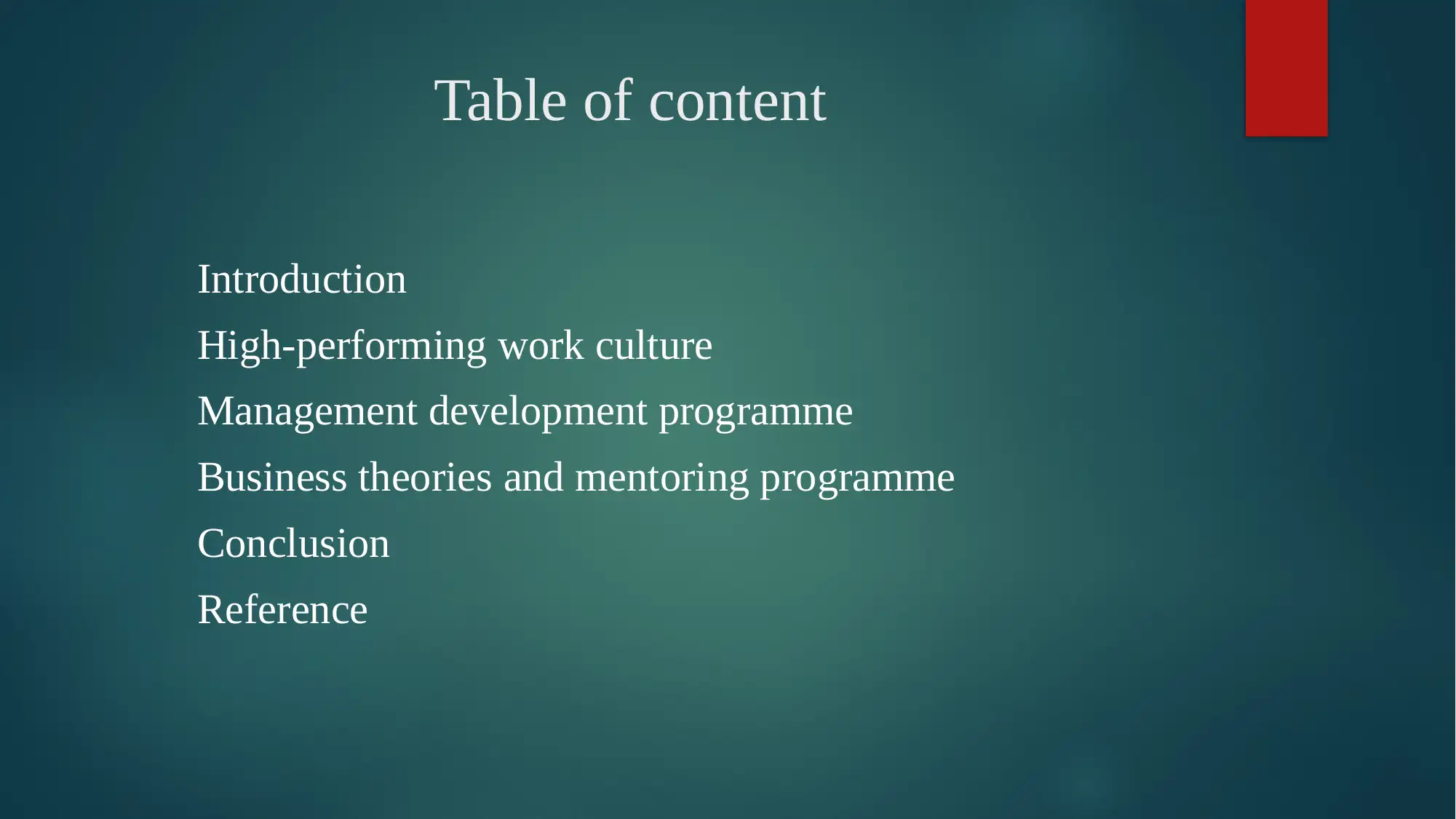
Table of content
Introduction
High-performing work culture
Management development programme
Business theories and mentoring programme
Conclusion
Reference
Introduction
High-performing work culture
Management development programme
Business theories and mentoring programme
Conclusion
Reference
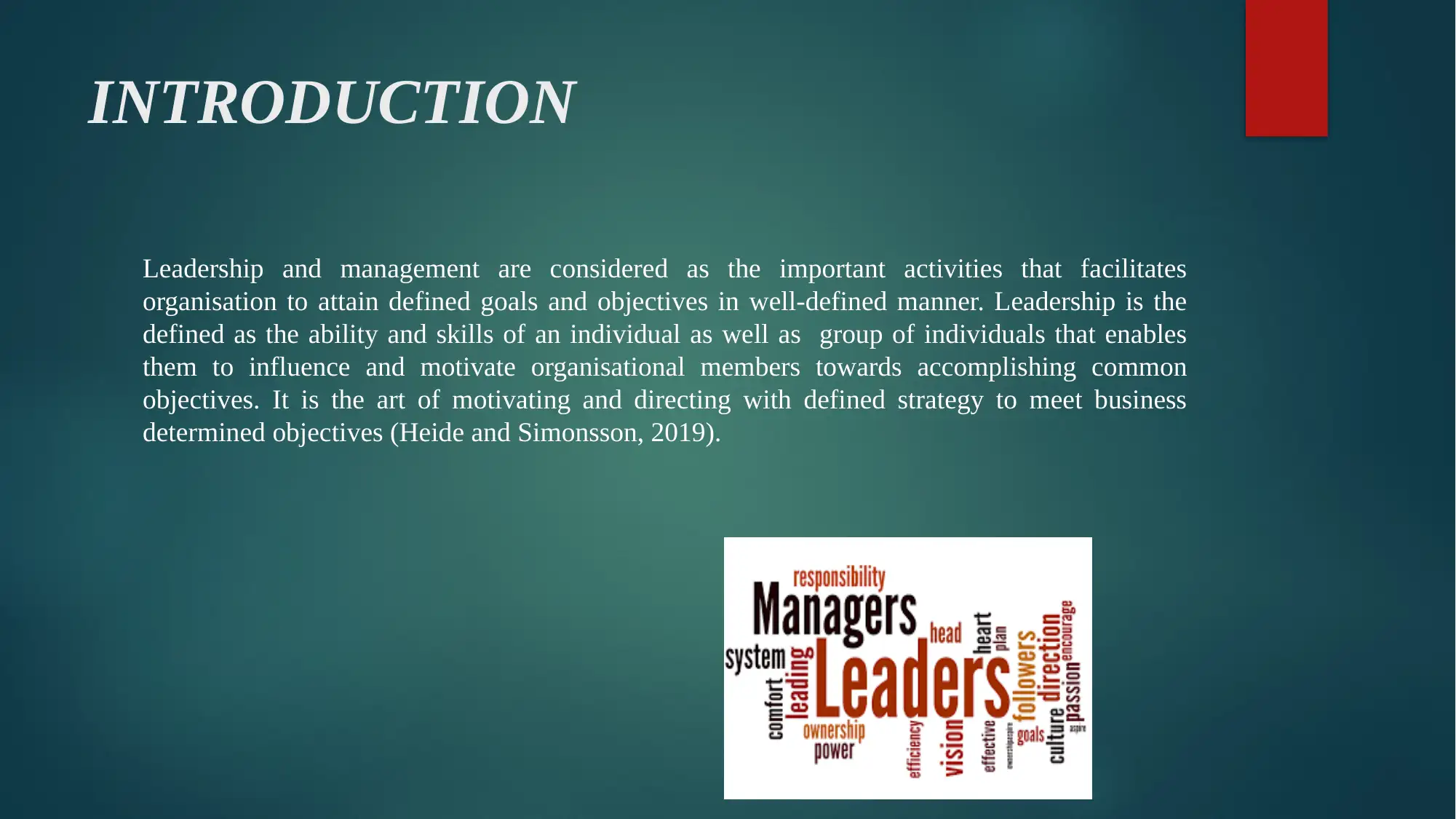
INTRODUCTION
Leadership and management are considered as the important activities that facilitates
organisation to attain defined goals and objectives in well-defined manner. Leadership is the
defined as the ability and skills of an individual as well as group of individuals that enables
them to influence and motivate organisational members towards accomplishing common
objectives. It is the art of motivating and directing with defined strategy to meet business
determined objectives (Heide and Simonsson, 2019).
Leadership and management are considered as the important activities that facilitates
organisation to attain defined goals and objectives in well-defined manner. Leadership is the
defined as the ability and skills of an individual as well as group of individuals that enables
them to influence and motivate organisational members towards accomplishing common
objectives. It is the art of motivating and directing with defined strategy to meet business
determined objectives (Heide and Simonsson, 2019).
⊘ This is a preview!⊘
Do you want full access?
Subscribe today to unlock all pages.

Trusted by 1+ million students worldwide
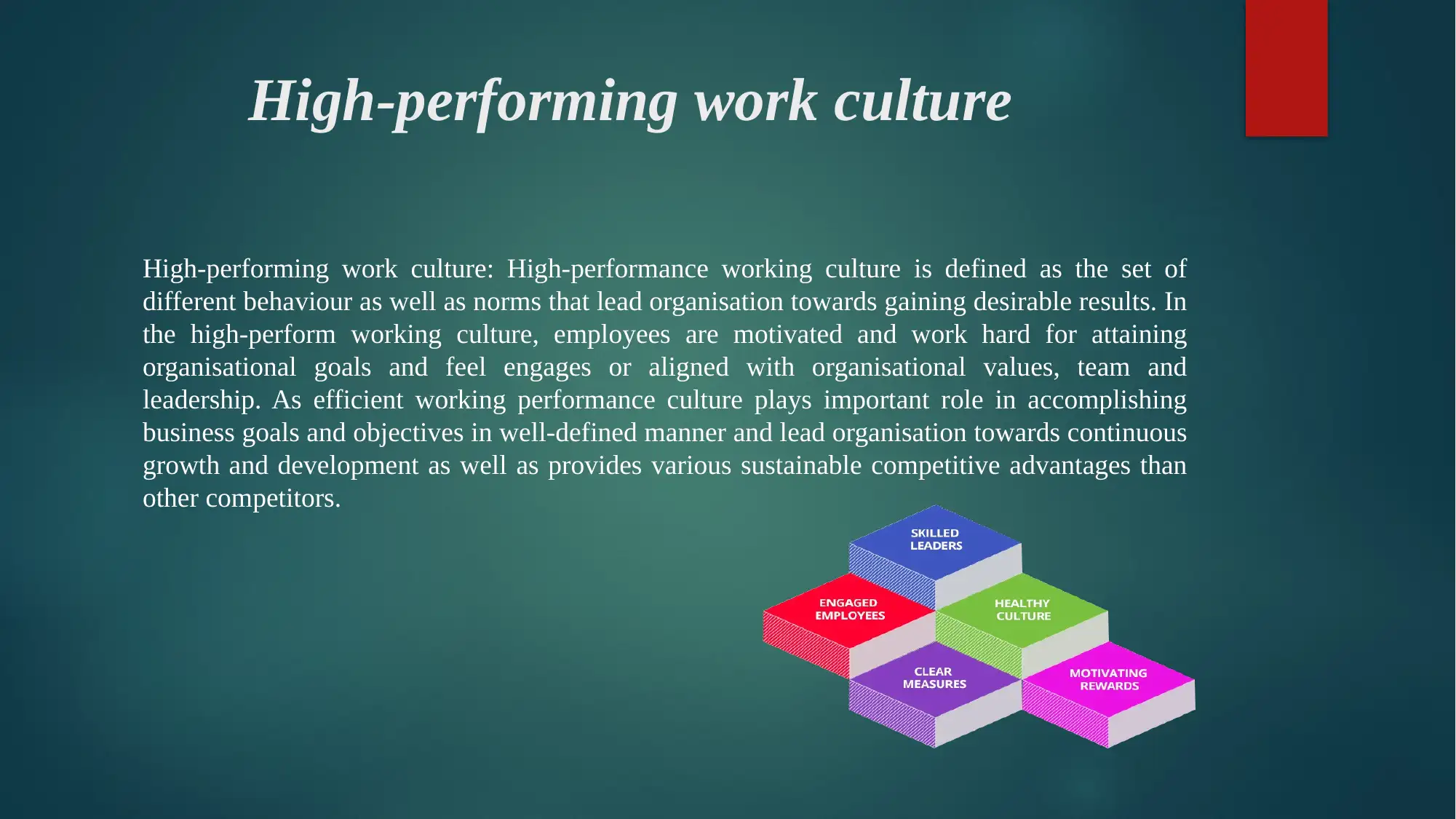
High-performing work culture
High-performing work culture: High-performance working culture is defined as the set of
different behaviour as well as norms that lead organisation towards gaining desirable results. In
the high-perform working culture, employees are motivated and work hard for attaining
organisational goals and feel engages or aligned with organisational values, team and
leadership. As efficient working performance culture plays important role in accomplishing
business goals and objectives in well-defined manner and lead organisation towards continuous
growth and development as well as provides various sustainable competitive advantages than
other competitors.
High-performing work culture: High-performance working culture is defined as the set of
different behaviour as well as norms that lead organisation towards gaining desirable results. In
the high-perform working culture, employees are motivated and work hard for attaining
organisational goals and feel engages or aligned with organisational values, team and
leadership. As efficient working performance culture plays important role in accomplishing
business goals and objectives in well-defined manner and lead organisation towards continuous
growth and development as well as provides various sustainable competitive advantages than
other competitors.
Paraphrase This Document
Need a fresh take? Get an instant paraphrase of this document with our AI Paraphraser
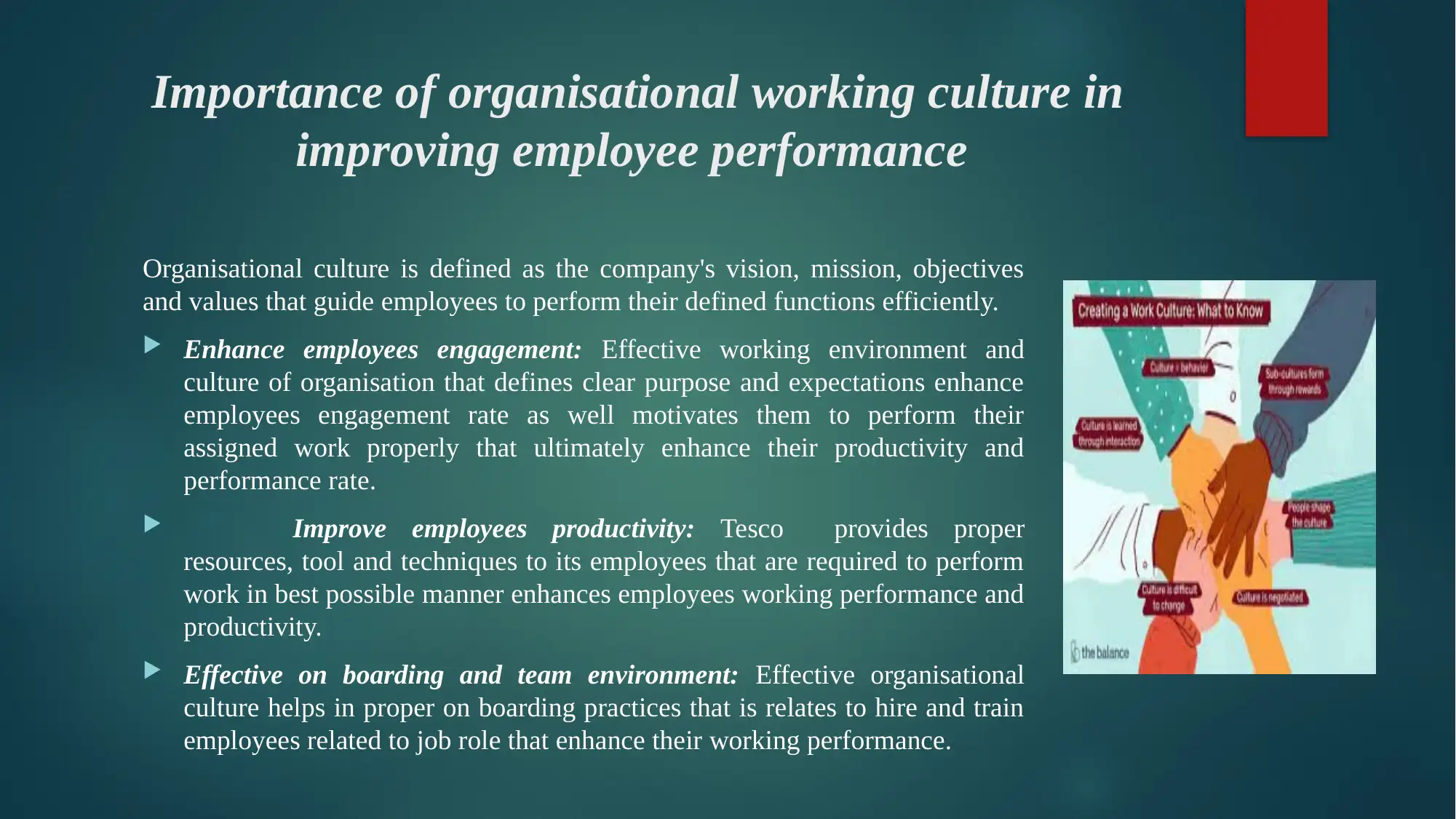
Importance of organisational working culture in
improving employee performance
Organisational culture is defined as the company's vision, mission, objectives
and values that guide employees to perform their defined functions efficiently.
Enhance employees engagement: Effective working environment and
culture of organisation that defines clear purpose and expectations enhance
employees engagement rate as well motivates them to perform their
assigned work properly that ultimately enhance their productivity and
performance rate.
Improve employees productivity: Tesco provides proper
resources, tool and techniques to its employees that are required to perform
work in best possible manner enhances employees working performance and
productivity.
Effective on boarding and team environment: Effective organisational
culture helps in proper on boarding practices that is relates to hire and train
employees related to job role that enhance their working performance.
improving employee performance
Organisational culture is defined as the company's vision, mission, objectives
and values that guide employees to perform their defined functions efficiently.
Enhance employees engagement: Effective working environment and
culture of organisation that defines clear purpose and expectations enhance
employees engagement rate as well motivates them to perform their
assigned work properly that ultimately enhance their productivity and
performance rate.
Improve employees productivity: Tesco provides proper
resources, tool and techniques to its employees that are required to perform
work in best possible manner enhances employees working performance and
productivity.
Effective on boarding and team environment: Effective organisational
culture helps in proper on boarding practices that is relates to hire and train
employees related to job role that enhance their working performance.
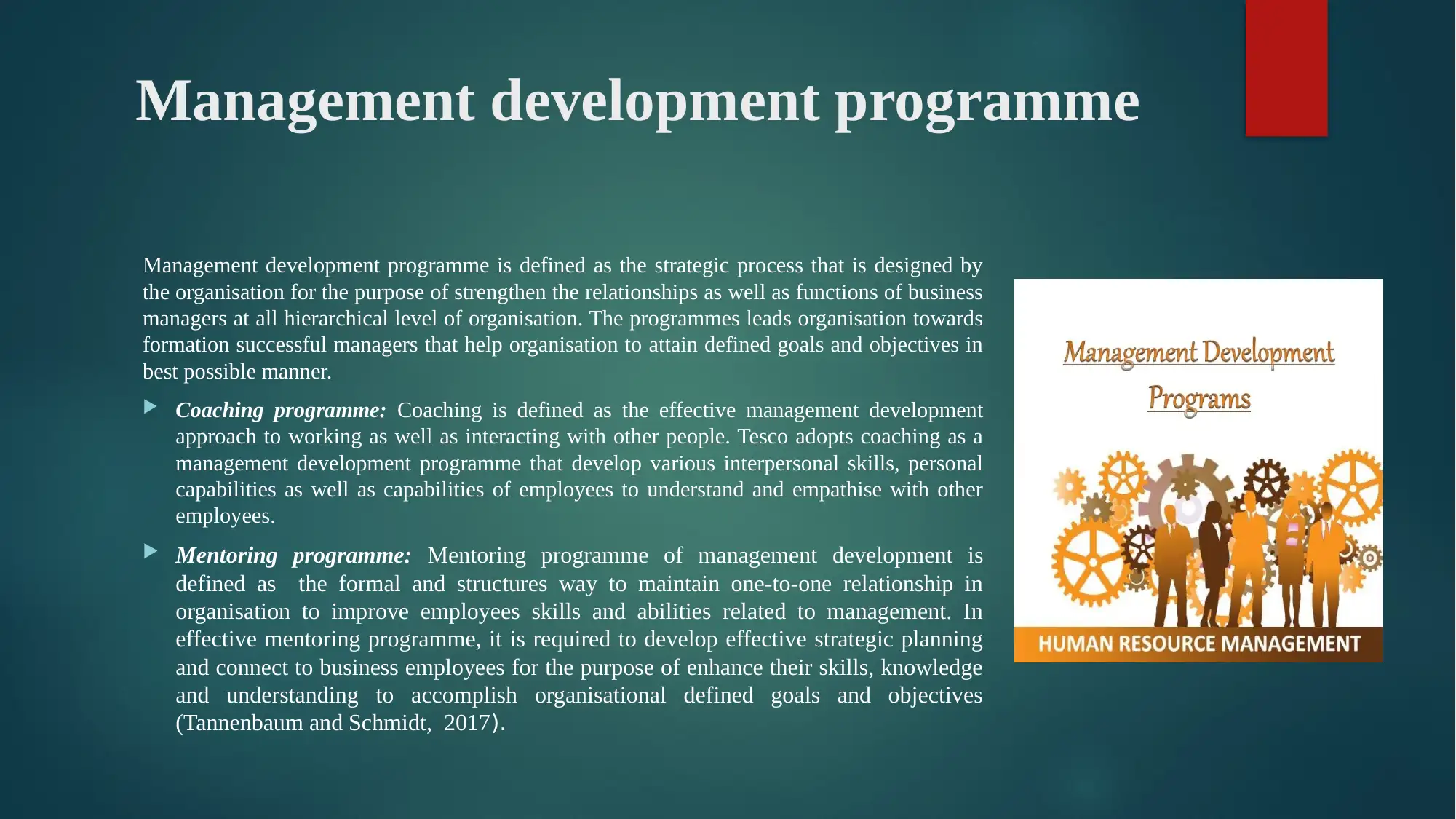
Management development programme
Management development programme is defined as the strategic process that is designed by
the organisation for the purpose of strengthen the relationships as well as functions of business
managers at all hierarchical level of organisation. The programmes leads organisation towards
formation successful managers that help organisation to attain defined goals and objectives in
best possible manner.
Coaching programme: Coaching is defined as the effective management development
approach to working as well as interacting with other people. Tesco adopts coaching as a
management development programme that develop various interpersonal skills, personal
capabilities as well as capabilities of employees to understand and empathise with other
employees.
Mentoring programme: Mentoring programme of management development is
defined as the formal and structures way to maintain one-to-one relationship in
organisation to improve employees skills and abilities related to management. In
effective mentoring programme, it is required to develop effective strategic planning
and connect to business employees for the purpose of enhance their skills, knowledge
and understanding to accomplish organisational defined goals and objectives
(Tannenbaum and Schmidt, 2017).
Management development programme is defined as the strategic process that is designed by
the organisation for the purpose of strengthen the relationships as well as functions of business
managers at all hierarchical level of organisation. The programmes leads organisation towards
formation successful managers that help organisation to attain defined goals and objectives in
best possible manner.
Coaching programme: Coaching is defined as the effective management development
approach to working as well as interacting with other people. Tesco adopts coaching as a
management development programme that develop various interpersonal skills, personal
capabilities as well as capabilities of employees to understand and empathise with other
employees.
Mentoring programme: Mentoring programme of management development is
defined as the formal and structures way to maintain one-to-one relationship in
organisation to improve employees skills and abilities related to management. In
effective mentoring programme, it is required to develop effective strategic planning
and connect to business employees for the purpose of enhance their skills, knowledge
and understanding to accomplish organisational defined goals and objectives
(Tannenbaum and Schmidt, 2017).
⊘ This is a preview!⊘
Do you want full access?
Subscribe today to unlock all pages.

Trusted by 1+ million students worldwide
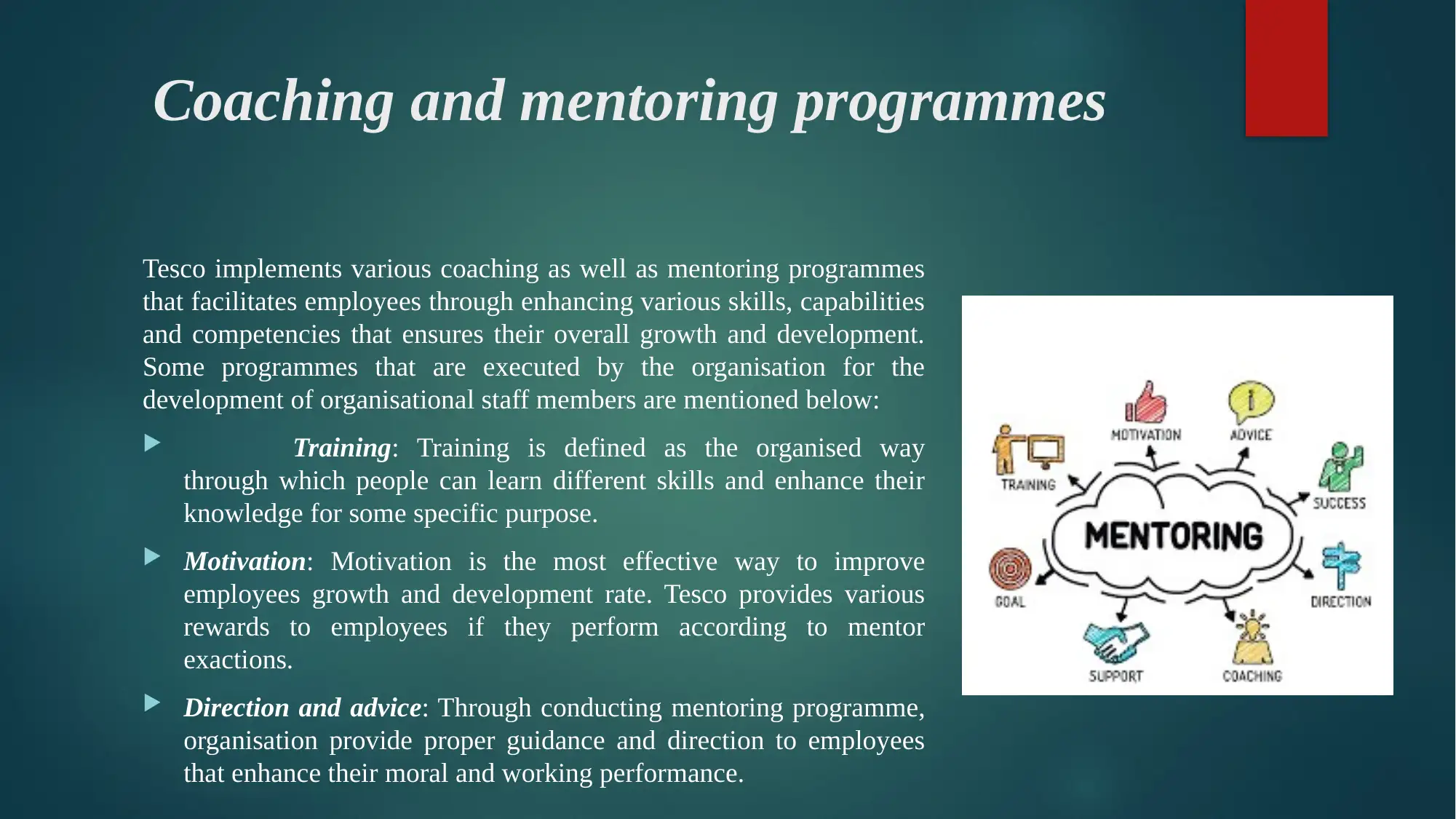
Coaching and mentoring programmes
Tesco implements various coaching as well as mentoring programmes
that facilitates employees through enhancing various skills, capabilities
and competencies that ensures their overall growth and development.
Some programmes that are executed by the organisation for the
development of organisational staff members are mentioned below:
Training: Training is defined as the organised way
through which people can learn different skills and enhance their
knowledge for some specific purpose.
Motivation: Motivation is the most effective way to improve
employees growth and development rate. Tesco provides various
rewards to employees if they perform according to mentor
exactions.
Direction and advice: Through conducting mentoring programme,
organisation provide proper guidance and direction to employees
that enhance their moral and working performance.
Tesco implements various coaching as well as mentoring programmes
that facilitates employees through enhancing various skills, capabilities
and competencies that ensures their overall growth and development.
Some programmes that are executed by the organisation for the
development of organisational staff members are mentioned below:
Training: Training is defined as the organised way
through which people can learn different skills and enhance their
knowledge for some specific purpose.
Motivation: Motivation is the most effective way to improve
employees growth and development rate. Tesco provides various
rewards to employees if they perform according to mentor
exactions.
Direction and advice: Through conducting mentoring programme,
organisation provide proper guidance and direction to employees
that enhance their moral and working performance.
Paraphrase This Document
Need a fresh take? Get an instant paraphrase of this document with our AI Paraphraser
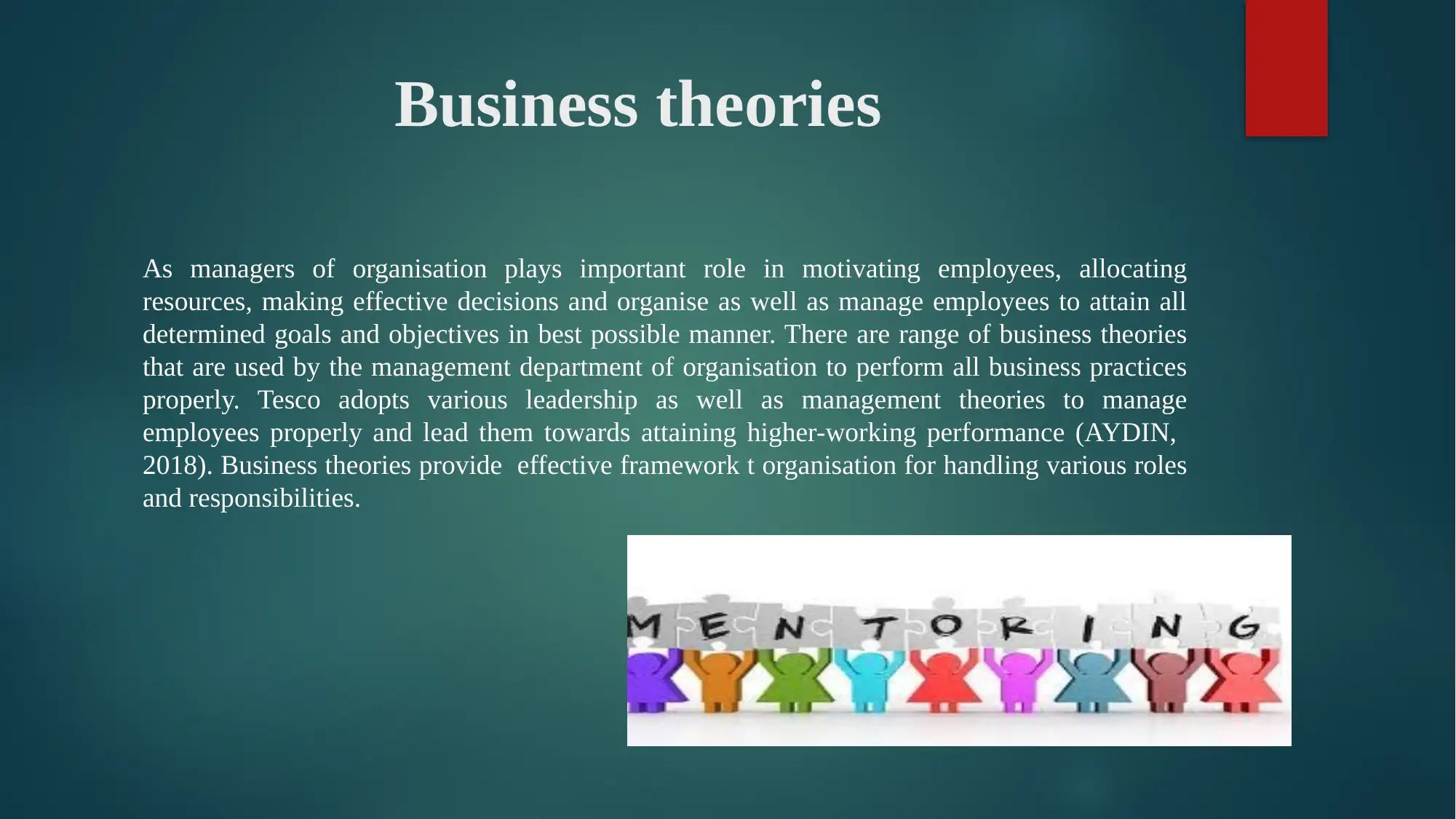
Business theories
As managers of organisation plays important role in motivating employees, allocating
resources, making effective decisions and organise as well as manage employees to attain all
determined goals and objectives in best possible manner. There are range of business theories
that are used by the management department of organisation to perform all business practices
properly. Tesco adopts various leadership as well as management theories to manage
employees properly and lead them towards attaining higher-working performance (AYDIN,
2018). Business theories provide effective framework t organisation for handling various roles
and responsibilities.
As managers of organisation plays important role in motivating employees, allocating
resources, making effective decisions and organise as well as manage employees to attain all
determined goals and objectives in best possible manner. There are range of business theories
that are used by the management department of organisation to perform all business practices
properly. Tesco adopts various leadership as well as management theories to manage
employees properly and lead them towards attaining higher-working performance (AYDIN,
2018). Business theories provide effective framework t organisation for handling various roles
and responsibilities.
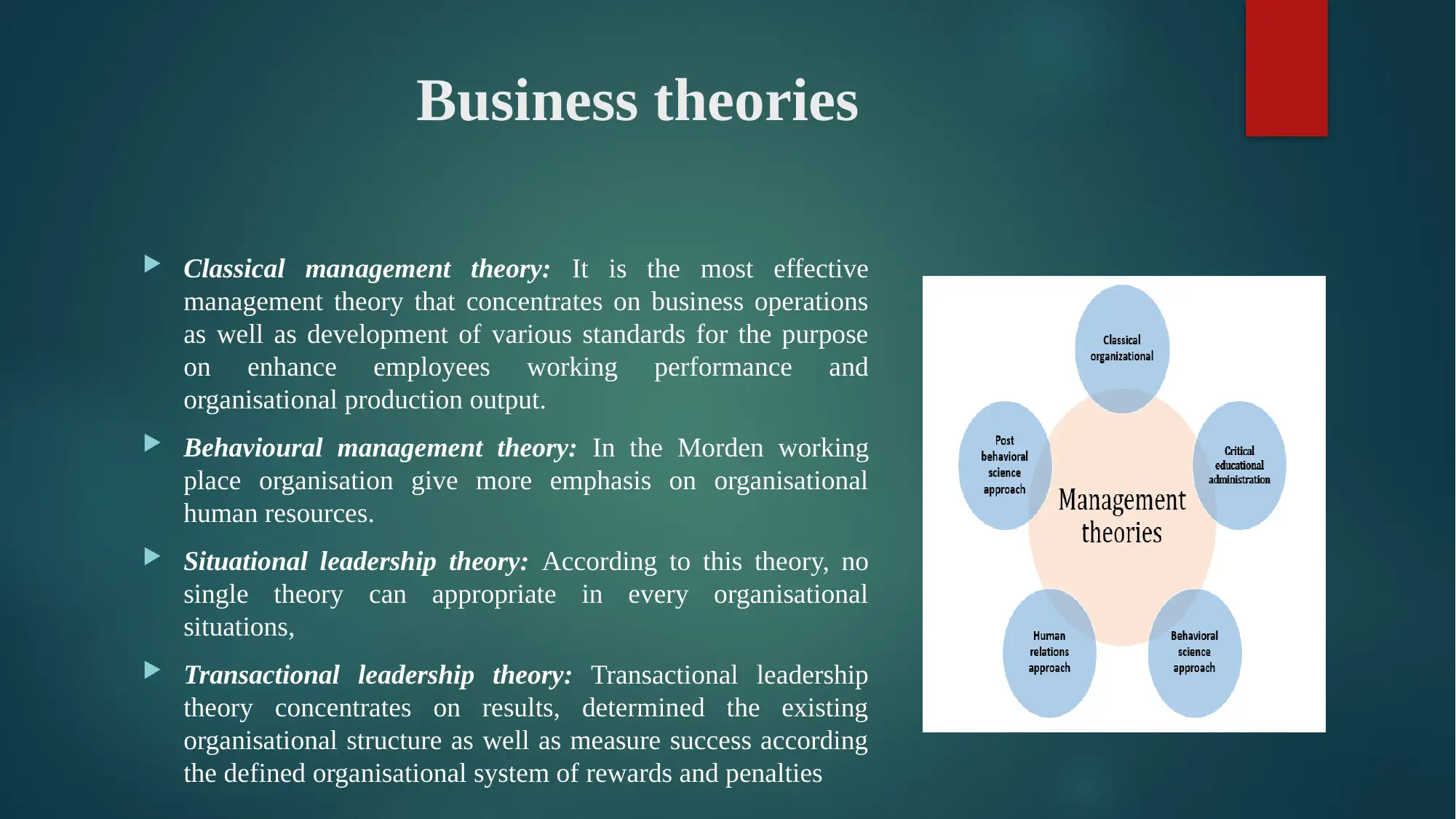
Business theories
Classical management theory: It is the most effective
management theory that concentrates on business operations
as well as development of various standards for the purpose
on enhance employees working performance and
organisational production output.
Behavioural management theory: In the Morden working
place organisation give more emphasis on organisational
human resources.
Situational leadership theory: According to this theory, no
single theory can appropriate in every organisational
situations,
Transactional leadership theory: Transactional leadership
theory concentrates on results, determined the existing
organisational structure as well as measure success according
the defined organisational system of rewards and penalties
Classical management theory: It is the most effective
management theory that concentrates on business operations
as well as development of various standards for the purpose
on enhance employees working performance and
organisational production output.
Behavioural management theory: In the Morden working
place organisation give more emphasis on organisational
human resources.
Situational leadership theory: According to this theory, no
single theory can appropriate in every organisational
situations,
Transactional leadership theory: Transactional leadership
theory concentrates on results, determined the existing
organisational structure as well as measure success according
the defined organisational system of rewards and penalties
⊘ This is a preview!⊘
Do you want full access?
Subscribe today to unlock all pages.

Trusted by 1+ million students worldwide
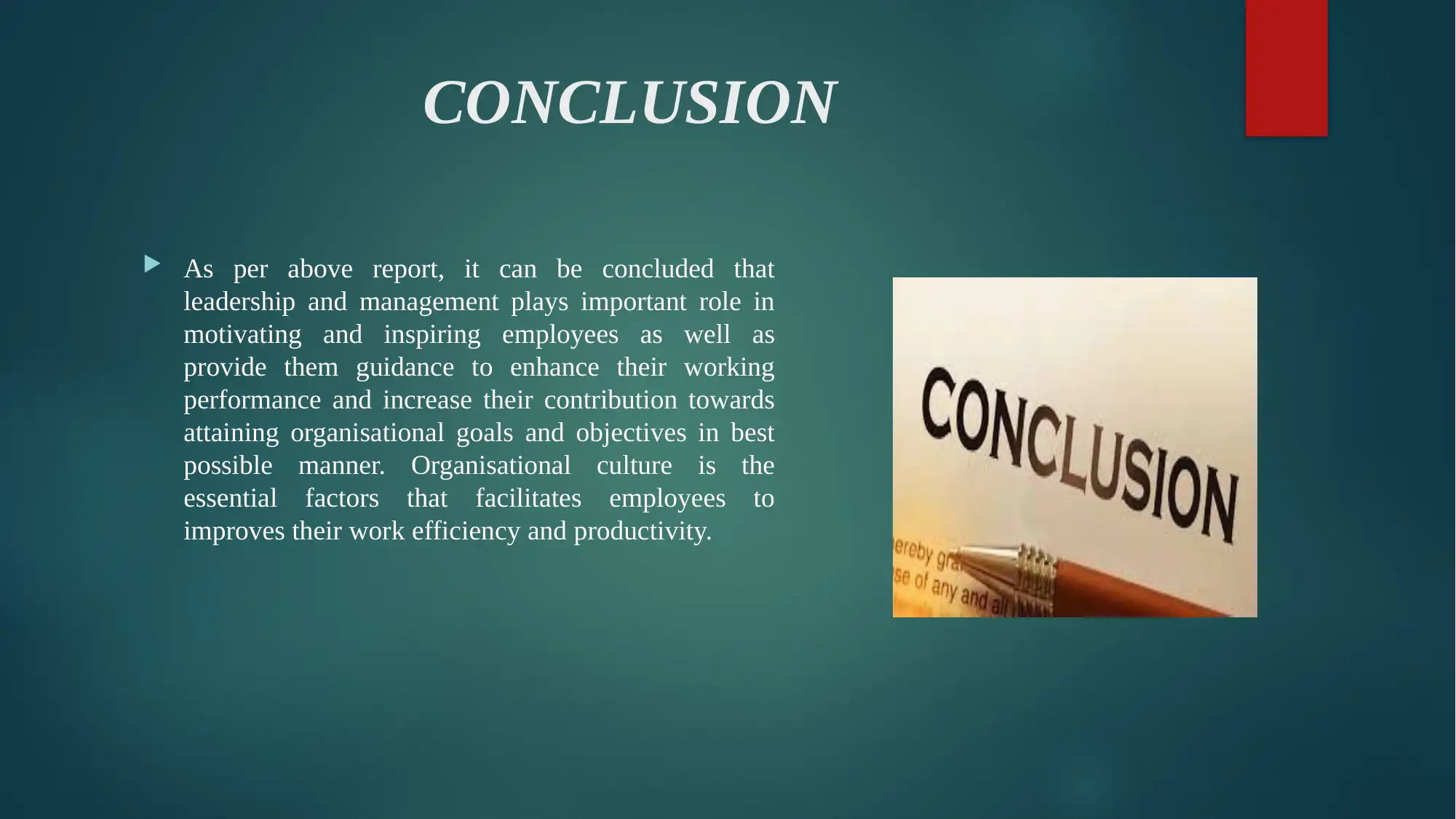
CONCLUSION
As per above report, it can be concluded that
leadership and management plays important role in
motivating and inspiring employees as well as
provide them guidance to enhance their working
performance and increase their contribution towards
attaining organisational goals and objectives in best
possible manner. Organisational culture is the
essential factors that facilitates employees to
improves their work efficiency and productivity.
As per above report, it can be concluded that
leadership and management plays important role in
motivating and inspiring employees as well as
provide them guidance to enhance their working
performance and increase their contribution towards
attaining organisational goals and objectives in best
possible manner. Organisational culture is the
essential factors that facilitates employees to
improves their work efficiency and productivity.
Paraphrase This Document
Need a fresh take? Get an instant paraphrase of this document with our AI Paraphraser
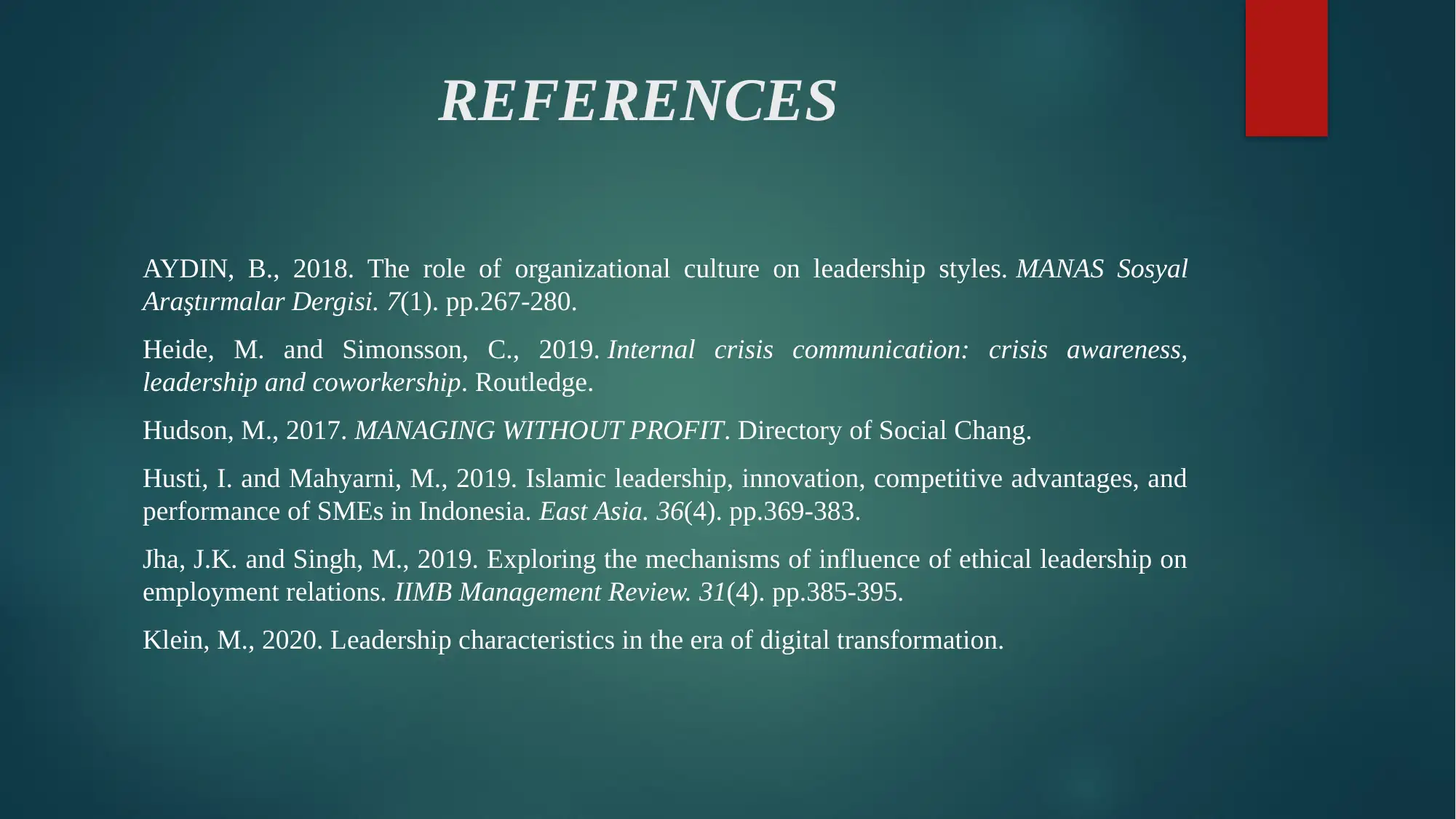
REFERENCES
AYDIN, B., 2018. The role of organizational culture on leadership styles. MANAS Sosyal
Araştırmalar Dergisi. 7(1). pp.267-280.
Heide, M. and Simonsson, C., 2019. Internal crisis communication: crisis awareness,
leadership and coworkership. Routledge.
Hudson, M., 2017. MANAGING WITHOUT PROFIT. Directory of Social Chang.
Husti, I. and Mahyarni, M., 2019. Islamic leadership, innovation, competitive advantages, and
performance of SMEs in Indonesia. East Asia. 36(4). pp.369-383.
Jha, J.K. and Singh, M., 2019. Exploring the mechanisms of influence of ethical leadership on
employment relations. IIMB Management Review. 31(4). pp.385-395.
Klein, M., 2020. Leadership characteristics in the era of digital transformation.
AYDIN, B., 2018. The role of organizational culture on leadership styles. MANAS Sosyal
Araştırmalar Dergisi. 7(1). pp.267-280.
Heide, M. and Simonsson, C., 2019. Internal crisis communication: crisis awareness,
leadership and coworkership. Routledge.
Hudson, M., 2017. MANAGING WITHOUT PROFIT. Directory of Social Chang.
Husti, I. and Mahyarni, M., 2019. Islamic leadership, innovation, competitive advantages, and
performance of SMEs in Indonesia. East Asia. 36(4). pp.369-383.
Jha, J.K. and Singh, M., 2019. Exploring the mechanisms of influence of ethical leadership on
employment relations. IIMB Management Review. 31(4). pp.385-395.
Klein, M., 2020. Leadership characteristics in the era of digital transformation.

Thank-You
⊘ This is a preview!⊘
Do you want full access?
Subscribe today to unlock all pages.

Trusted by 1+ million students worldwide
1 out of 12
Related Documents
Your All-in-One AI-Powered Toolkit for Academic Success.
+13062052269
info@desklib.com
Available 24*7 on WhatsApp / Email
![[object Object]](/_next/static/media/star-bottom.7253800d.svg)
Unlock your academic potential
Copyright © 2020–2026 A2Z Services. All Rights Reserved. Developed and managed by ZUCOL.



